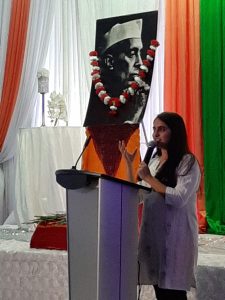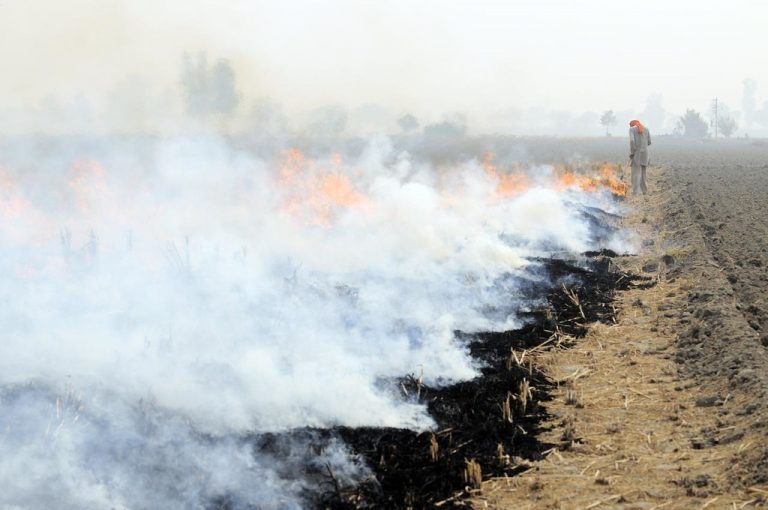Interview with Rudri Bhatt, an MSc student in the Institute for Resources, Environment, and Sustainability. Bhatt was the recipient of the Nehru Humanitarian Graduate Award in 2019.

Rudri Bhatt accepting the Nehru Humanitarian Award in November 2019.
U: Congratulations on receiving the Nehru Humanitarian Award and thank you for zooming in for this interview!
To start, could you tell us a bit about your academic background?
R: First of all, I’d like to thank the Goel family for giving me the award, and the CISAR for organizing this and selecting me! As for my academic background, I have a Bachelor’s of Engineering in Civil and Environmental Engineering from Israel, at the Technion-Israel Institute of Technology. Growing up, I was mostly interested in doing Environmental Engineering, and hence I decided to go to Israel, where Technion had a good water treatment program. It was there that I learned a lot about water treatment and water resource engineering. Having worked with Engineers Without Borders there for 3 years, I got more interested in looking more at the application side of Engineering and finding simple solutions for communities, which inspired me to pursue further education.
U: Why did you choose UBC for grad school?
R: As I was looking for grad schools, I knew I wanted to be more research-focused. So, I was looking at Faculty Profiles, and what research was happening around. My supervisor at UBC is Dr. Milind Kandlikar, and his research really resonated with me, and I thought “oh–this is exactly what I want to be doing for the next 10-20 years!” So, I applied here, and got in! Now I’m finishing up my Masters in Environmental Sustainability.
U: What led you to be interested in air quality and energy security in developing countries?
R: I grew up in India in Mumbai, and later in a city called Ahmedabad, in a privileged family. But, I did see that there were a lot of people who did not have access to clean air quality, drinking water, and clean energy. This seems like a very privileged thing to have, but it should be a human right! This led me to want to do something about it, and having my education and background, it could be my contribution to society and where I apply my work. So, I decided to study it more and pursue that path.
As I said before, I worked with Engineers without Borders in Israel, which is a student-led organization where we work with communities, for communities. We developed a sort of simple heating system for a Kindergarten class and local Bedouin communities. This was really inspiring. I could see the result of my work immediately, I could see who I was working with, and I really enjoyed that connection. I could see the positive impact of my work, and it encouraged me to go further into this topic.
At UBC, I worked a summer internship with MITACS, with Ecotrust Canada. There, we worked with two Indigenous communities and one rural community in British Columbia, working towards providing energy security: specifically, trying to bring down the cost of space heating. It was an incredible experience and gave me a lot of new skill sets, as well as the Canadian context of what access to clean energy looks like, the inequities related to it, and where my contribution could be in the narrative to help make it better.
U: Could you provide us with some details of your current research based in Punjab, India?
R: My research is looking at ambient air quality in the Indo-Gangetic plain, which is home to about half a billion people. Especially in the Northern part of India, every winter (you can see in the news), the air quality becomes 50 times more hazardous than what the WHO suggests. A major contributor to this is the open fields that burn in the Punjab. After the rice harvest, there is a lot of residue left over, which the farmers burn openly, as there are a lot of economic and policy challenges to managing the residue in a sustainable way. My research essentially is looking at farmers’ perspectives to open residue burning and their perspectives on the sustainable alternatives available and allocated by the government. There are also a lot of policy interventions, so I went and interviewed farmers trying to understand what additional policy interventions are required, and what the current challenges and loopholes are in the help that the government is providing.
Open residue burning is banned in the Northern part of India right now, but it still occurs– there is a big risk of losing subsidies and even having FIRs and police complaints against the farmers but they have to run that risk, and burn the residue, as there is no other option. So, my work is to understand what the solution landscape would look like from the farmers’ perspectives. A lot of work has been done to sort of quantify the contributions of crop residue burning to air pollution, but the farmers themselves have not been included in the conversation as much, so I’m trying to address that.

Crop residue burning in Punjab, India: the focus of Bhatt’s research.
U: What other applications do you see for your research?
R: This is actually a very important topic because all around the world, crop residue gets burnt, and especially in developing countries. Regions such as India, China, and South America– even Vancouver, which has taken out guidelines to stop the open burning of organic matter, as it releases a lot of particulate matter that is especially harmful to humans as it goes in deposits deep within our respiratory systems and it has long term health effects as well. This does have a lot of applications around the world, but I had to start with one place, and so I picked Punjab as my case study. I do hope this can be expanded to other areas as well.
U: What would be your advice to students who are thinking of pursuing graduate school and research?
R: I would say go for it! It seems a bit daunting initially, and there is so much uncertainty of, “what I will choose?”, “what topic will be there?”. Even towards the end of my first year of my Masters, I was not 100% sure, as it was between this topic and something else. It does get overwhelming because there are peers and faculty doing such incredible research, but there is always a place you can find where you fit in. So definitely go for it, and do what you’re most passionate about.
Thank you so much for taking the time to come in, we at the Centre wish you the best of luck and look forward to hearing from you again in the future!
Interviewed by Umaiyahl Nageswaran